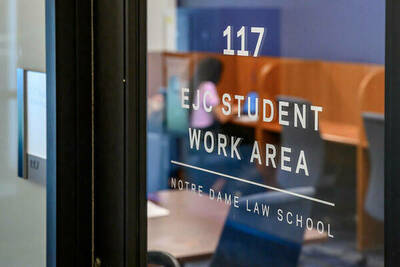Notre Dame Law School's Exoneration Justice Clinic earns second DOJ grant in two years

Notre Dame Law School's Exoneration Justice Clinic (EJC) has secured a substantial new grant from the Bureau of Justice Assistance at the U.S. Department of Justice (DOJ). This is the second grant the clinic has received from the DOJ in the last two years.
The EJC was selected as one of six innocence clinics nationwide for funding by the DOJ through the Edward Byrne Memorial Justice Assistance Grant (JAG) program.
In 2021, the EJC received its first two-year grant of $300,000. This latest two-year $462,000 grant elevates the EJC's total funding to an impressive $762,000 for the clinic, which has been in operation for only three years.
Dean G. Marcus Cole said, “In just three years, the Exoneration Justice Clinic, led by Professor Jimmy Gurulé, has achieved remarkable success, securing two substantial grants from the Department of Justice. This recognition is a testament to the clinic's commitment to justice, and the dedication and hard work of Prof. Gurulé, the staff, and our students.”
The grant will support the hiring of a second full-time staff lawyer to oversee the intake process for case selection and the retention of a full-time, in-house investigator for two more years. The EJC is one of the few innocence clinics in the country that employs a full-time investigator.
Professor Jimmy Gurulé, founder and faculty director of the Exoneration Justice Clinic, submitted both grant proposals and is very excited about the support and recognition the clinic has received from the DOJ and how impactful the grant will be.
“This recognition and confirmation by the DOJ speak to the quality and credibility of the work we are doing, and the very important progress we have made as a new clinic,” said Gurulé. “It shows the confidence the DOJ has in our program and the impact we are making.”
The EJC is the only organization in Indiana whose full-time mission is to investigate and litigate wrongful conviction cases in the state. The growing problem of wrongful convictions has led to an increased demand for legal representation by Indiana prison inmates claiming actual innocence. And, while convictions in Indiana will remain a priority, the grant will enable the clinic to branch out and expand.
The grant will allow the EJC to take on more cases, overturn more wrongful convictions, and have a greater impact on criminal justice reform in Indiana. It will also greatly expand students’ opportunities to work on clinic cases.
Gurulé said that it is a compliment to the hard work of EJC staff and students who work in the clinic. “Two awards in the last two years for a clinic that has been in operation for only three years is very impressive,” he said.
This grant announcement comes just a week after the Exoneration Justice Clinic announced that they had been selected after a national search to receive a grant from the Mexican Ministry of Foreign Affairs of $3 million to administer a program for the defense of Mexican nationals in criminal matters in the United States, marking the largest grant ever received by a Notre Dame Law School clinic.
The Exoneration Justice Clinic has developed quickly since launching in fall 2020. They moved into their own dedicated office space in 2021 and the clinic marked its first exoneration in July 2021 when a judge approved the Elkhart County prosecutor’s motion to dismiss the murder charge against Andrew Royer, an Exoneration Justice Clinic client who was wrongfully convicted of a 2002 murder in Elkhart, Indiana. The clinic is working on several other cases and has filed a petition for post-conviction relief in five pending cases.